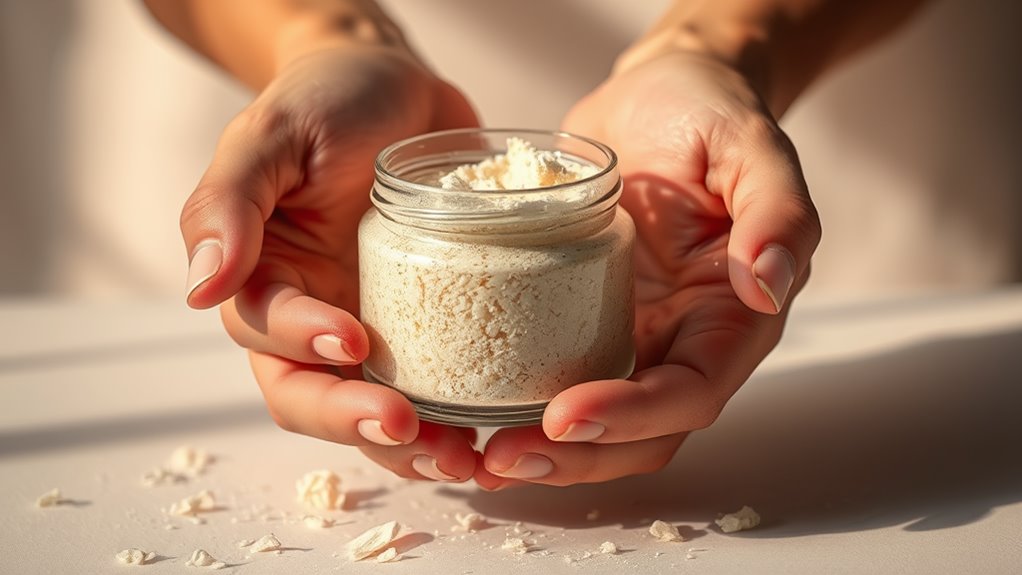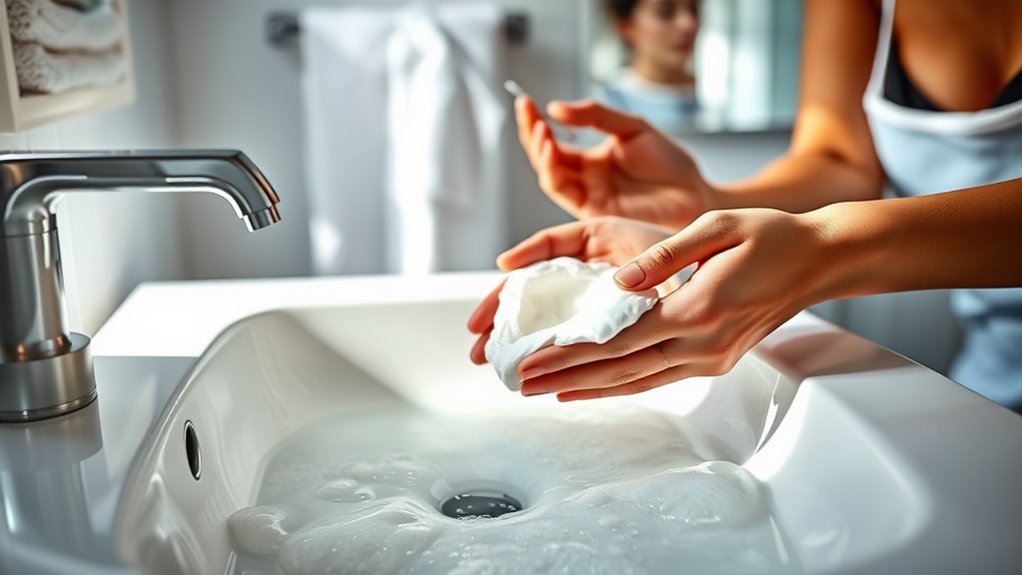Why Your Skincare Routine Isn’t Working (And How to Fix It)
Your skincare routine isn’t delivering results because you might be skipping crucial steps and not understanding your skin type. It’s essential to use products tailored to your unique needs and avoid expired items that can lead to breakouts. Overloading on active ingredients can irritate rather than help. Don’t forget sunscreen, and adjust your routine with the seasons. Plus, managing stress and maintaining a nutritious diet are vital for vibrant skin. Discover key strategies to enhance your results.
Key Takeaways
- Skipping crucial steps in your routine, like exfoliation, hinders product effectiveness and skin adaptation.
- Ensure your products match your skin type; improper selections can lead to ineffective results.
- Regularly check expiration dates; using expired products can cause breakouts and diminish benefits.
- Apply sunscreen daily and reapply every two hours to protect against UV damage and support skin health.
- Maintain consistency and patience in your routine; immediate results are unrealistic and skin improvements take time.
Lack of Consistency
When you skip steps in your skincare routine, you’re likely undermining the benefits of the products you’ve chosen. Consistency is crucial; without it, your skincare routine isn’t effective. Each product is designed to work synergistically, enhancing overall results.
If you neglect certain steps or use products sporadically, you’re not allowing your skin to adapt and respond positively. For instance, skipping exfoliation can lead to buildup, rendering serums and moisturizers less effective. Additionally, achieving healthy skin requires a commitment to a consistent regimen that allows your skin to fully benefit from each product.
Establish a regular schedule, applying products in the correct order: cleanse, tone, treat, and moisturize. This habit creates a foundation for your skin to thrive.
Not Understanding Your Skin Type
Understanding your skin type is crucial for effective skincare.
By identifying your unique skin characteristics, you can select products that truly address your needs, whether you have oily, dry, or combination skin.
Tailoring your routine accordingly not only enhances your skin’s health but also maximizes the results you achieve with your products. Additionally, knowing how to identify your skin type can significantly improve your product selection and overall skincare effectiveness.
Identifying Skin Characteristics
Identifying your skin characteristics is crucial for effective skincare, especially since many people struggle to pinpoint their exact skin type.
Start by assessing your skin’s texture and oiliness. Is it dry, oily, or somewhere in between? Pay attention to how your skin reacts after cleansing; if it feels tight, you likely have dry skin, while excessive shine indicates oiliness.
Next, observe your skin’s sensitivity. Do you experience redness or irritation with certain products? This may suggest sensitive skin.
Additionally, monitor your skin’s hydration levels, as well as any concerns like acne or aging. Keeping a skin diary can help track changes over time.
Understanding these attributes sets the foundation for a successful, personalized skincare regimen.
Tailoring Products Accordingly
Tailoring products to your specific skin type is essential for achieving optimal results, yet many people overlook this critical step. Understanding whether you have oily, dry, combination, or sensitive skin helps you choose the right ingredients and formulations.
Here’s how to ensure your products align with your skin’s needs:
- Identify your skin type through observation or professional consultation.
- Choose non-comedogenic products if you’re prone to breakouts.
- Opt for hydrating formulas if your skin feels tight or flaky.
- Incorporate soothing ingredients like chamomile or aloe for sensitive skin.
- Adjust your routine seasonally; humidity and temperature can affect your skin’s behavior.
Taking the time to tailor your routine can significantly enhance your skincare results and overall complexion health.
Using Expired Products
While you might think that using expired skincare products is harmless, doing so can lead to a host of issues for your skin.
When products sit on the shelf past their expiration date, their effectiveness diminishes, and they may become contaminated with harmful bacteria. Ingredients can break down, altering their chemical structure and potentially causing irritation or allergic reactions.
This is especially true for products containing active ingredients like retinol or vitamin C, which lose potency over time. Using expired products can also result in clogged pores, breakouts, or uneven skin tone. Additionally, certain anti-aging ingredients may not provide the intended benefits if they are past their prime.
To maintain optimal skin health, always check expiration dates and replace any outdated items promptly. Your skin deserves the best, so don’t compromise its integrity with expired formulations.
Overloading on Active Ingredients
When you overload your skincare routine with too many active ingredients, you might unintentionally sabotage your skin’s health. Each active ingredient serves a specific purpose, and using them in excess can lead to irritation, sensitivity, and even breakouts. Over-exfoliating can also cause barrier damage, which compromises your skin’s ability to retain moisture and protect against environmental stressors.
It’s essential to balance efficacy with gentleness.
Consider these points to refine your routine:
-
Identify Your Skin Type: Tailor your active ingredients to your skin’s unique needs.
-
Limit the Number: Stick to two or three key actives to avoid overwhelming your skin.
-
Introduce Gradually: Start with one active and observe how your skin reacts.
-
Monitor Reactions: Watch for signs of irritation and adjust accordingly.
-
Consult Experts: Seek professional advice for personalized recommendations.
Mastering your skincare routine requires thoughtful selection and application.
Ignoring the Importance of Sunscreen
Even if you have a meticulous skincare routine, neglecting sunscreen can undermine all your efforts. UV radiation is a primary cause of premature aging, hyperpigmentation, and even skin cancer. Without proper protection, all the serums and moisturizers you use become less effective. You should choose a broad-spectrum sunscreen with at least SPF 30 and apply it daily, regardless of the weather. Don’t forget to reapply every two hours, especially if you’re outdoors. Incorporating sunscreen into your routine isn’t just a recommendation; it’s essential for maintaining healthy skin, as it serves as your skin’s best defense against harmful UV rays.
Neglecting Proper Cleansing Techniques
Proper cleansing techniques are crucial for achieving and maintaining healthy skin. If you’re not cleansing effectively, you might be sabotaging your entire skincare routine.
Here are some key points to consider:
-
Choose the Right Cleanser: Tailor your cleanser to your skin type for maximum efficacy.
-
Double Cleanse: Start with an oil-based cleanser to remove makeup and follow with a water-based one for deeper cleansing.
-
Gentle Touch: Use light pressure and circular motions to avoid irritating your skin.
-
Timing Matters: Cleanse your face twice daily—morning and night—to prevent buildup.
-
Thorough Rinsing: Ensure you rinse completely, as residue can lead to breakouts or irritation.
Mastering these techniques is essential for optimal skin health and the effectiveness of subsequent products.
Skipping Moisturizer
Although it’s tempting to skip moisturizer, especially if your skin feels oily or you’re in a hurry, doing so can lead to a host of problems.
Moisturizer plays a crucial role in maintaining your skin’s barrier function, preventing transepidermal water loss. When you forgo this essential step, your skin compensates by producing excess oil, which can exacerbate breakouts and lead to an uneven texture.
Additionally, neglecting moisturizer can result in dullness and increased sensitivity over time. To optimize your skincare routine, choose a lightweight, non-comedogenic moisturizer suitable for your skin type.
Apply it generously after cleansing and before any treatments to lock in hydration and enhance your skin’s overall appearance.
Inadequate Hydration
Neglecting to moisturize often leads to inadequate hydration, which can be just as detrimental to your skin’s health.
When your skin lacks moisture, it may appear dull, flaky, or even prematurely aged.
To improve your skin’s hydration levels, consider these essential practices:
- Drink plenty of water daily to maintain internal hydration.
- Choose a moisturizer that suits your skin type and contains hydrating ingredients like hyaluronic acid.
- Incorporate serums or oils that lock in moisture.
- Avoid hot showers that can strip your skin of natural oils.
- Use a humidifier to add moisture to the air, especially in dry environments.
Not Adjusting for Seasonal Changes
As the seasons change, your skin’s needs shift dramatically, and it’s crucial to adjust your skincare routine accordingly.
During colder months, you may need richer moisturizers to combat dryness, while warmer months might call for lighter formulas to prevent excess oil.
Ignoring these changes can lead to imbalances, so staying attentive to your skin’s seasonal requirements is essential for maintaining its health and appearance.
Seasonal Skin Needs
When the seasons change, your skin’s needs shift dramatically, yet many people continue to use the same routine year-round. This oversight can lead to dryness, irritation, or breakouts as your skin reacts to environmental factors.
To optimize your skincare, consider these key seasonal adjustments:
-
Hydration: Increase moisture during winter months to combat dryness.
-
Sunscreen: Use a broad-spectrum SPF year-round, but apply more liberally in summer.
-
Exfoliation: Adjust frequency based on skin’s sensitivity; it may need more in spring.
-
Ingredients: Incorporate heavier oils in colder months and lighter gels in warmer temperatures.
-
Routine Timing: Consider changing your routine in the morning versus evening based on seasonal humidity levels.
Mastering these adjustments can significantly improve your skin’s health and appearance.
Product Adjustments Essential
While it might seem convenient to stick with the same skincare products all year, failing to adjust your selections can hinder your skin’s health.
Seasonal changes dramatically impact your skin’s hydration, oil production, and overall needs. In winter, for instance, switch to richer moisturizers to combat dryness, while in summer, opt for lightweight, oil-free formulas to prevent breakouts.
Additionally, consider incorporating products with SPF during sunny months and hydrating serums during colder seasons. Keep an eye on your skin’s reactions; you might need to alter ingredients based on environmental factors.
Regularly evaluate your routine, and don’t hesitate to adapt as your skin responds to the changing climate. Mastering these adjustments can significantly enhance your skincare outcomes.
Stress and Its Impact on Skin
Stress can significantly affect your skin’s health, often manifesting as breakouts, dryness, or premature aging. When you’re stressed, your body produces cortisol, which can lead to increased oil production and inflammation. This can exacerbate existing skin conditions or trigger new ones.
To combat stress-related skin issues, consider the following:
- Practice mindfulness techniques like meditation or deep breathing.
- Incorporate regular exercise to boost endorphins and improve circulation.
- Ensure you have a consistent sleep routine; lack of sleep worsens stress.
- Stay hydrated; water helps maintain skin elasticity and overall health.
- Limit caffeine and alcohol, as they can contribute to dehydration and stress levels.
Poor Diet and Its Effects
Your skincare routine can be severely impacted by what you put on your plate. A poor diet, rich in processed foods, sugars, and unhealthy fats, can trigger inflammation, leading to breakouts and dull skin.
Nutrient deficiencies, particularly in vitamins A, C, and E, can impair skin repair and vitality. Hydration is equally critical; insufficient water intake can result in dryness and lackluster skin.
Incorporating whole foods, such as fruits, vegetables, lean proteins, and healthy fats, is essential for nurturing your skin from the inside out. Antioxidants found in these foods combat oxidative stress, enhancing your skin’s resilience.
Unrealistic Expectations
How often do we set ourselves up for disappointment with unrealistic skincare expectations? Many of us expect immediate results, but skincare is a long-term commitment.
To achieve the glowing skin you desire, it’s crucial to temper your expectations. Consider these common misconceptions:
- You’ll see results overnight.
- A single product can solve all your skin issues.
- Skincare routines are one-size-fits-all.
- Expensive products guarantee better results.
- Natural products are always better for your skin.
Understanding that consistency and patience are key will empower you to make informed choices.
Instead of chasing quick fixes, focus on cultivating a routine that suits your unique needs. This mindset shift can ultimately lead you to the radiant skin you seek.




